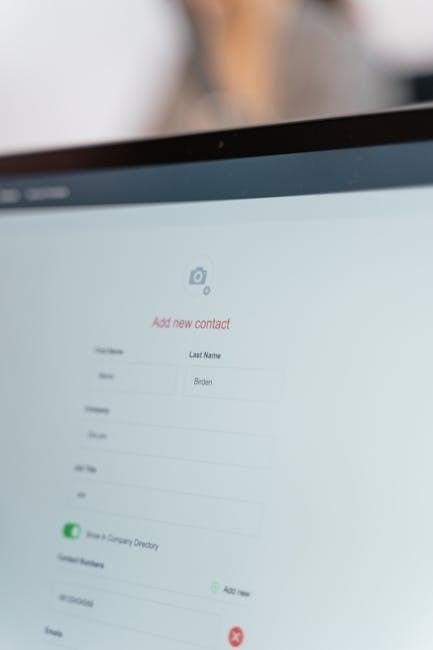
The NJ Judge Directory PDF offers a comprehensive guide to New Jersey’s judicial system, detailing judge profiles, court structures, and legal procedures for public and professional access.
1.1 What is the NJ Judge Directory PDF?
The NJ Judge Directory PDF is an official document that provides detailed information about judges serving in New Jersey’s judicial system. It includes biographies, contact details, and court assignments, offering a comprehensive overview of the state’s judiciary. The directory is updated annually to reflect changes in judicial appointments, retirements, and transfers. It serves as a vital resource for legal professionals, researchers, and the public, ensuring transparency and accessibility to judicial information. The PDF format allows users to easily search, download, and print the directory, making it a convenient tool for staying informed about New Jersey’s judicial structure and personnel.
1.2 Purpose of the Directory
The primary purpose of the NJ Judge Directory PDF is to provide a centralized and accessible resource for individuals seeking information about New Jersey’s judges and court system. It aims to enhance transparency by offering detailed profiles of judges, including their judicial experience, areas of expertise, and contact information. The directory serves as a reference for legal professionals, such as attorneys and law firms, to identify appropriate judicial contacts for their cases. Additionally, it caters to the general public by providing a clear understanding of the judicial hierarchy and court operations. By maintaining updated and accurate information, the directory ensures that users can efficiently navigate the judicial system and access necessary resources.
1.3 Scope and Coverage
The NJ Judge Directory PDF encompasses a wide range of judicial information, covering all levels of courts within New Jersey, including Superior Courts, Municipal Courts, and Federal Courts. It provides detailed profiles of judges, their jurisdictions, and areas of specialization, ensuring comprehensive coverage of the state’s judicial system. The directory includes contact information for judges’ chambers, court locations, and operational hours, making it a valuable resource for legal professionals and the public alike. Additionally, it outlines the organizational structure of the judiciary, offering insights into how cases are managed and adjudicated across different court systems. The scope extends to historical context, recent appointments, and updates on judicial procedures, ensuring users have access to both current and foundational information.

Structure and Organization of the Directory
The directory is organized into clear sections, categorizing courts by type, with detailed judge profiles, contact information, and judicial hierarchy for easy navigation and reference.
2.1 Judicial Hierarchy in New Jersey
The judicial hierarchy in New Jersey is structured to ensure efficient administration of justice. At the top is the Supreme Court, the highest judicial authority, overseeing all lower courts. Below it is the Superior Court, which handles civil, criminal, and family cases, divided into Law and Chancery divisions. The Tax Court specializes in tax-related disputes, while Municipal Courts address local ordinance violations, traffic offenses, and minor criminal matters. This hierarchical system ensures cases are directed to the appropriate court based on jurisdiction and complexity. The directory provides detailed profiles of judges serving at each level, along with their court assignments and contact information, making it a vital resource for understanding New Jersey’s judicial framework.
2.2 County and Municipal Courts
County and Municipal Courts in New Jersey play a crucial role in addressing local legal matters. Municipal Courts handle traffic violations, minor criminal offenses, and local ordinance violations, operating at the community level. County courts, part of the Superior Court system, manage more complex cases, including civil disputes and criminal matters. The directory provides detailed listings of judges serving in these courts, along with their contact information and court locations. For instance, Municipal Courts in Cape May and Somerville are highlighted, with operational hours and specific judges noted. This section ensures transparency and accessibility, allowing residents to navigate the legal system efficiently. The inclusion of judges like Robert M. Lepore in Pt. Pleasant Beach exemplifies the directory’s commitment to providing comprehensive judicial details.
2.3 Federal Courts in New Jersey
Federal Courts in New Jersey operate under the U.S. District Court system, handling cases involving federal laws, constitutional issues, and disputes crossing state lines. The U.S. District Court for the District of New Jersey is divided into multiple locations, including Camden, Newark, and Trenton, each serving specific counties. These courts adjudicate cases such as federal crimes, bankruptcy filings, and civil rights disputes. The directory includes listings of federal judges, their chambers, and contact details, ensuring transparency and accessibility. For example, Judge Martini’s requirements for searchable PDF submissions highlight the court’s emphasis on modern legal practices. This section is vital for understanding the federal judicial framework in New Jersey and how it intersects with state and local courts.

2.4 Contact Information and Details
The NJ Judge Directory PDF provides detailed contact information for judges and courts across New Jersey, ensuring easy access for legal professionals and the public. Listings include office addresses, phone numbers, and email contacts for judges in various jurisdictions. For example, Judge Robert M. Lepore in Point Pleasant Beach is listed with his court days and office hours. Additionally, the directory includes contact details for court clerks and administrative staff, such as Tracey McCrystal in Point Pleasant Beach. This section also highlights the importance of searchable PDF formats for court submissions, as required by judges like Martini. The directory ensures transparency and efficiency in accessing judicial resources, making it an indispensable tool for anyone engaging with New Jersey’s legal system.

Importance and Purpose
The NJ Judge Directory PDF serves as an essential resource, providing transparency and accessibility to judicial information for legal professionals, researchers, and the public, ensuring informed engagement with the judicial system.
3.1 Role in the Judicial System
The NJ Judge Directory PDF plays a pivotal role in the judicial system by providing detailed information about judges, courts, and legal procedures. It serves as a central resource for legal professionals, ensuring they can efficiently navigate court operations and case management. The directory also aids the public by offering transparency into the judicial process, making it easier to understand court functions and access necessary legal services. By listing judge profiles, court locations, and contact details, the directory facilitates smoother legal proceedings and enhances accountability within the system. It is an indispensable tool for maintaining order and efficiency in New Jersey’s judicial framework, supporting both professionals and citizens alike in their interactions with the courts.
3.2 Benefits for Legal Professionals
The NJ Judge Directory PDF is an invaluable resource for legal professionals, offering quick access to detailed information about judges, court locations, and legal procedures. It streamlines case management by providing updated contact details and judicial assignments, enabling attorneys to prepare more effectively for hearings and trials. The directory also aids in understanding specific judges’ precedents and court rules, which can inform legal strategies and improve case outcomes. Additionally, it facilitates communication between legal teams and court officials, ensuring smoother coordination of legal matters. For law firms and solo practitioners, the directory serves as a centralized reference, saving time and enhancing workflow efficiency. Its comprehensive and organized format makes it an essential tool for navigating New Jersey’s judicial landscape.

3.3 Value to the General Public

The NJ Judge Directory PDF provides transparency and accessibility to judicial information for the general public, fostering trust and understanding of the legal system. It allows citizens to easily locate and contact judges, courts, and legal offices, making it simpler to navigate legal processes. The directory includes details about court procedures, which can help individuals prepare for appearances or filings. Additionally, it serves as an educational resource, offering insights into the judicial structure and the roles of judges. This accessibility empowers citizens to engage more effectively with the legal system, whether for personal matters or community concerns. By democratizing judicial information, the directory strengthens public awareness and participation, ensuring that justice is both accessible and accountable to all residents of New Jersey.

Accessing the Directory
The NJ Judge Directory PDF is accessible online through official court websites, allowing easy download and offline access. It is mobile-friendly, ensuring convenience for all users. Regular updates maintain its relevance.
4.1 Online Availability
The NJ Judge Directory PDF is readily available online through the official New Jersey Courts website at https://www.njcourts.gov. Users can download the document directly from the site’s resources section. The directory is published in a searchable PDF format, making it easy to navigate and find specific information quickly. Additionally, the document is optimized for mobile devices, ensuring accessibility on smartphones and tablets. Regular updates are provided to reflect changes in the judiciary, such as new appointments or retirements. To ensure accuracy, users are advised to verify the version date and download the latest edition. For convenience, the directory can be accessed without creating an account, though some features may require registration. The online availability ensures that legal professionals and the public can access judicial information efficiently and reliably.
4.2 Offline Access Methods
The NJ Judge Directory PDF can also be accessed offline by downloading it from the official New Jersey Courts website. Once downloaded, the document can be saved to a local device, such as a computer or tablet, for offline viewing. Users can also print the directory for physical access. Additionally, some legal professionals and organizations may distribute the directory on USB drives or through internal networks for offline use. Courts and law libraries often provide physical copies or digital versions stored on their systems, ensuring accessibility without internet connectivity. Offline access is particularly useful for researchers, attorneys, and individuals in areas with limited internet availability. The PDF format ensures that the directory remains intact and searchable even without an internet connection, making it a reliable resource for offline use. This method is ideal for preparation, research, or situations where online access is unavailable.
4.3 Required Software for Viewing
To view the NJ Judge Directory PDF, users typically require a PDF viewer. Adobe Acrobat Reader is the most commonly used software due to its compatibility and features like search, zoom, and annotation tools. Free alternatives, such as Foxit Reader or SumatraPDF, also support PDF viewing. Additionally, many web browsers, including Chrome, Firefox, and Edge, have built-in PDF viewers, allowing users to open the document directly within the browser. Mobile devices often have native PDF viewers or apps like Adobe Acrobat Reader for iOS and Android. Ensuring the latest version of the software is installed is recommended for optimal functionality. Some browsers may require additional plugins for advanced features. Overall, the widespread availability of PDF viewers ensures easy access to the directory across various devices and platforms.

Historical Overview
The NJ Judge Directory PDF traces its origins to the establishment of New Jersey’s judicial system, evolving through key milestones and adapting to digitalization for enhanced accessibility and efficiency.
5.1 Evolution of the Judiciary
The New Jersey judiciary has undergone significant transformations since its inception, reflecting societal changes and legal advancements. The 19th century saw the establishment of a formal judicial structure, while the 20th century introduced reforms to enhance judicial independence and efficiency. The evolution has been marked by the expansion of court systems, including the creation of specialized courts and the integration of technology to improve access to justice. Historical milestones, such as the adoption of the 1947 New Jersey Constitution, reshaped the judiciary’s role, ensuring a more equitable and transparent legal framework. Today, the judiciary continues to adapt, embracing digital innovations to meet modern demands while maintaining its core mission of upholding the rule of law.

5.2 Key Milestones
Several pivotal events have shaped the New Jersey judiciary’s development. The adoption of the 1947 New Jersey Constitution established a modern judicial framework, centralizing court administration. The 1970s saw the reorganization of the Superior Court, streamlining operations. In 1985, the U.S. Supreme Court’s decision in NEW JERSEY v. T.L.O. set legal precedents for student rights. The 1990s introduced specialized courts, such as the Tax Court, enhancing judicial efficiency. The 2000s marked digital advancements, with judicial directories becoming accessible online. These milestones reflect the judiciary’s commitment to innovation, transparency, and public access, ensuring its role in upholding justice remains robust and adaptable to societal needs.
5.3 Impact of Digitalization
Digitalization has revolutionized the accessibility and usability of judicial information in New Jersey. The NJ Judge Directory PDF exemplifies this shift, offering a searchable and downloadable format that enhances transparency. Legal professionals now access comprehensive judge profiles, court procedures, and contact details efficiently. The public benefits from easy access to judicial resources, fostering trust and engagement. Digitalization also supports real-time updates, ensuring accuracy and relevance. This modernization aligns with the judiciary’s commitment to innovation, making legal processes more accessible and streamlined for all users. The transition to digital formats underscores the importance of leveraging technology to maintain a fair and efficient judicial system. This evolution ensures that New Jersey’s judiciary remains at the forefront of legal accessibility and technological advancement.

Key Judges in New Jersey
The NJ Judge Directory PDF highlights notable judges, their contributions, and current appointees, providing insights into their roles and impact on the state’s judicial system and legal landscape.
6.1 Notable Judges
The NJ Judge Directory PDF features prominent judges who have significantly shaped New Jersey’s legal landscape. Judges like Martin Luther King Jr., known for their commitment to justice, and Judge Martini, recognized for his judicial reforms, are highlighted. These judges have contributed to landmark cases, ensuring fairness and integrity in the judicial process. Their dedication to upholding the law and advocating for judicial transparency has earned them respect statewide. The directory provides detailed profiles, including their judicial philosophies and notable rulings, offering insights into their impactful careers. This section is invaluable for legal professionals and the public seeking to understand the roles of key judicial figures in New Jersey’s court system. Their contributions underscore the importance of a fair and equitable judiciary.
6.2 Their Contributions
New Jersey’s notable judges have made significant contributions to the state’s judicial system. Judge Martini is recognized for his efforts in modernizing court procedures, emphasizing the use of searchable PDF submissions for efficiency. Judge Robert M. Lepore has been instrumental in overseeing municipal court operations, ensuring fair adjudication of local disputes. Judge Valerie H. has played a key role in managing case assignments, ensuring the smooth functioning of superior courts. These judges have upheld high legal standards, contributing to the integrity and effectiveness of New Jersey’s judiciary. Their work has also promoted transparency, making judicial processes more accessible to the public. The directory highlights their achievements, offering insights into their dedication to justice and their lasting impact on the legal landscape.
6.3 Current Appointees
The NJ Judge Directory PDF includes a detailed list of current appointees serving in New Jersey’s judicial system. Notable figures such as Judge Robert M. Lepore and Judge Valerie H. are highlighted for their roles in managing municipal and superior court operations. These judges are responsible for overseeing cases, ensuring fair proceedings, and maintaining judicial integrity. The directory also provides contact information, including phone numbers and court assignments, for judges like Judge Martini, who emphasizes the use of searchable PDF submissions for legal filings. Current appointees are organized by court vicinage, making it easy to locate judges serving in specific regions. The directory serves as a vital resource for understanding the current judicial leadership and their roles in upholding the law in New Jersey.
The NJ Judge Directory PDF serves as an indispensable resource for understanding New Jersey’s judicial system, offering insights into its structure, key judges, and operational frameworks. By providing detailed profiles and contact information, the directory ensures transparency and accessibility for legal professionals and the public alike. As technology advances, the directory is expected to evolve, incorporating features like AI-driven search capabilities and real-time updates for judicial appointments and court procedures. Future editions may also expand to include more interactive elements, such as clickable links to court websites and downloadable judge profiles. These enhancements will further solidify the directory’s role as a cornerstone of New Jersey’s legal infrastructure, ensuring it remains a vital tool for years to come.

